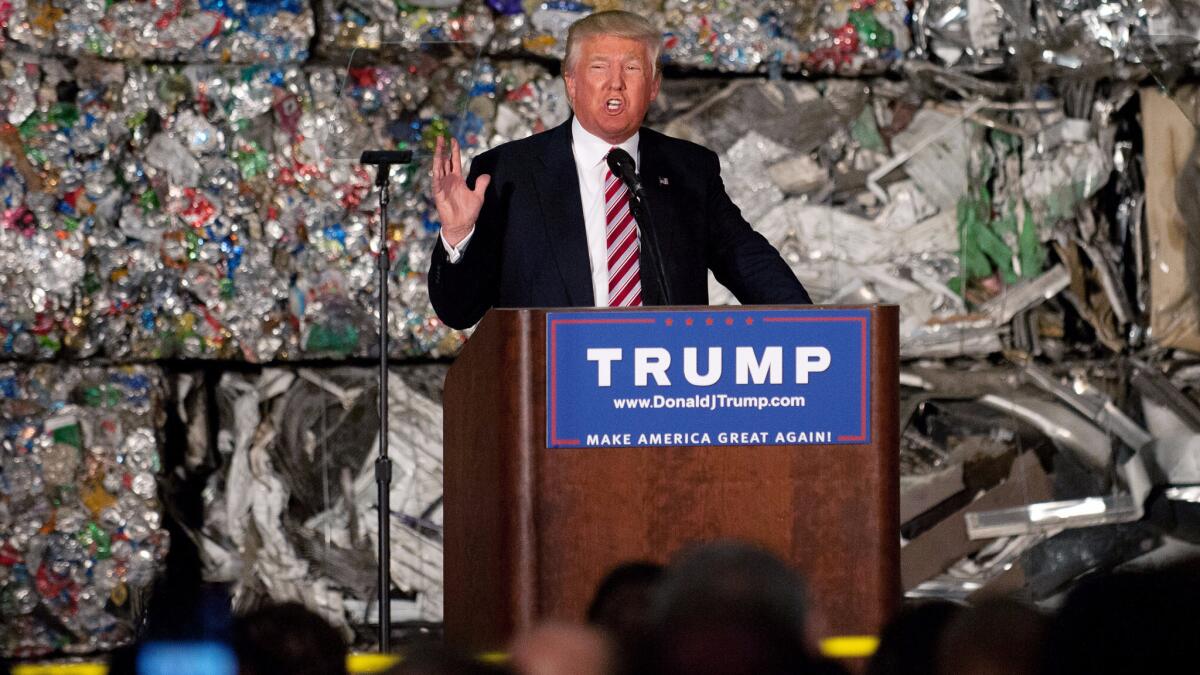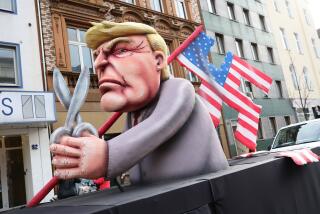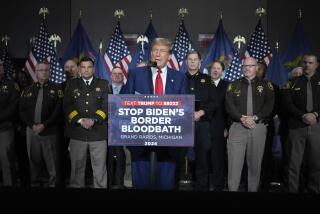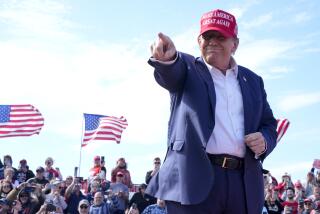Donald Trump vows in Rust Belt speech to punish China and end major trade deals

Donald Trump, who rode a wave of anti-globalism to the top of the GOP presidential field, made a series of pledges and threats Tuesday aimed at punishing China and divorcing the U.S. from trade deals he blames for the loss of manufacturing jobs.
The speech, delivered from a teleprompter at the Alumisource Factory in Monessen, Pa., was one of Trump’s most traditional, stylistically, since he entered the presidential race a year ago. Trump included 128 footnotes in his prepared remarks after contentious battles with fact-checkers who found last week’s speech attacking Hillary Clinton littered with falsehoods. But the content, one of Trump’s strongest attacks on trade, was at odds with Republicans’ longstanding alliance with business groups that favor loosening international barriers to commerce.
Trump blamed globalization for wiping out the middle class, and once again linked his candidacy to Great Britain’s vote last week to withdraw from the European Union, which devalued the pound and caused an international wave of economic anxiety.
“Globalization has made the financial elite who donate to politicians very, very wealthy,” Trump said from the heart of the battered Rust Belt, where voters embraced him during the GOP primaries. “I hate to say it, but I used to be one of them.”
Election 2016 | Live coverage on Trail Guide | Sign up for the newsletter
Indeed, he wrote a blog post in 2005 asserting that “outsourcing creates jobs in the long run.”
Trump’s speech took aim mostly at politicians, with little regard to the role that mechanization and corporate outsourcing — including by his own companies — have played in the decline of America’s industrial base.
“As Bernie Sanders said, Hillary Clinton ‘voted for virtually every trade agreement that has cost the workers of this country millions of jobs,’” Trump said, noting his alignment on the issue with Clinton’s Democratic primary rival.
Trump unveiled a seven-point plan that included an overt threat to withdraw from the North American Free Trade Agreement. Hillary Clinton supported the deal, negotiated by President George H.W. Bush and enacted by her husband, as well as with China’s 2001 admission to the World Trade Organization, which Trump blames for massive job losses.
Chinese exports to the U.S. have soared ever since, reaching a record $482 billion last year. And by some economists’ estimates, Chinese imports have resulted in a net loss of about 2 million domestic jobs from 1999 to 2011.
Even so, experts have noted that automation, skills training and other policy choices have played significant roles as well in the job losses and income declines of blue-collar workers, factors ignored by Trump. Nor did he mention that globalization and imports have reduced prices of goods for American consumers, benefiting especially lower-income families.
Trump’s comments threatening to withdraw from NAFTA or renegotiate “a better deal by a lot” echoed criticisms long voiced by organized labor, that the free-trade pacts between the U.S., Canada and Mexico have shuttered thousands of domestic plants and cost countless jobs. Still, trade among the three nations was growing well before the agreement took effect in 1993, and, according to congressional research, NAFTA’s net effect on the U.S. economy in the 20 years since was relatively small.
Trump’s plan also calls for withdrawing from the massive Pacific trade deal in the works, the Trans-Pacific Partnership, which Clinton pushed as secretary of State but now says she would not sign. He also called for punishing other countries for trade and currency violations, with a heavy emphasis on China. Trump said he would label China a currency manipulator, a designation that under current practice would be made after a review by the Treasury Department and could potentially set off punitive measures; Trump mentioned taxes and tariffs.
His rhetoric is at odds with many traditional GOP allies, such as the Chamber of Commerce, the National Assn. of Manufacturers, and the Business Roundtable, all of which criticized the speech.
Both Trump and Clinton are trying to attract voters in Rust Belt states such as Ohio, Pennsylvania, Wisconsin and Michigan, where the loss of the industrial base has left many voters with stagnant wages or without jobs. Trump has tended to do best among these voters, particularly white men without college degrees.
Trump’s tough message on China has found resonance among manufacturing workers, but some, like Cliff Tobey, 41, a third-generation miner in Minnesota’s Iron Range, weren’t impressed after hearing about Trump’s latest speech attacking China.
“The rhetoric is great, that Donald Trump is talking about these things,” said Tobey, who was laid off from his job last year. “My problem is, you see that he’s outsourcing his own things, like hats, and importing foreign workers.… I don’t think tariffs across the board against China, a trade war, is a good thing. It seems amateurish.”
Trump also criticized the Obama administration for failing to go after trade violations, although there are several anti-dumping and unfair trade cases against China and others in the works.
Clinton, speaking alongside Sen. Elizabeth Warren (D-Mass.) in Ohio on Monday, proposed appointing what she called a trade prosecutor, who would report directly to the president, “to end the abuse of our market, our workers, our people.” It is unclear what authority this position would carry that is not already vested in other high-level officials, including the International Trade Commission.
Trump doubted Clinton would abide by her opposition to the Pacific trade deal, predicting that, if elected, Clinton would merely revise it slightly to claim she improved it.
Though Republican Party leaders have traditionally championed trade deals, many of their voters dislike them.
More than two-thirds of Trump supporters viewed free trade agreements as a bad thing, according to a Pew Research Center survey in March.
In the Pew study, 53% of Republican voters said they viewed trade deals in a negative light, compared with 38% who viewed them positively. The numbers were practically reversed (34% negative and 56% positive) on the Democratic side.
Still, the Pew study found an overall majority supporting free trade.
“As a country, we really failed the losers from global economic competition,” said Edward Alden, a senior fellow at Council of Foreign Relations whose forthcoming book, “Failure to Adjust,” dissects the policy mistakes. “Trump, for all the fact that I think he is a terrible vessel for it, is tapping into some of that legitimate anger and resentment.”
Twitter: @noahbierman, @dleelatimes
ALSO:
Republicans release Benghazi report with no new evidence against Hillary Clinton
How Donald Trump’s speech attacking Hillary Clinton compares with the facts
More to Read
Get the L.A. Times Politics newsletter
Deeply reported insights into legislation, politics and policy from Sacramento, Washington and beyond. In your inbox three times per week.
You may occasionally receive promotional content from the Los Angeles Times.








